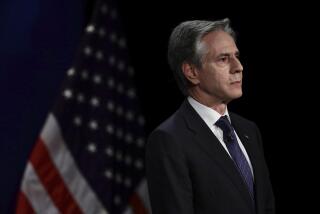Political Divide Limits U.S. Aid in Sri Lanka
- Share via
COLOMBO, Sri Lanka — As the first of several hundred Marines arrived here to offer humanitarian aid, U.S. officials acknowledged that the troops would be barred from entering some of this tsunami-ravaged nation’s most devastated territories.
Even as the Marines bulldozed debris along Sri Lanka’s southern shore and Air Force helicopters dropped tarpaulins and hygiene kits to disaster survivors, the U.S. forces steered clear of much the island’s northern and eastern regions -- areas controlled by ethnic Tamil separatists.
Despite a shaky, two-year cease-fire between the government of Sri Lanka and the Liberation Tigers of Tamil Eelam, U.S. law prohibits the military and government organizations like the U.S. Agency for International Development from assisting groups identified as terrorist organizations, such as the Tamil Tigers.
The law, as well as the 20-year civil war in Sri Lanka, has placed U.S. officials in an awkward position. By some estimates, more than 16,000 people died in territory controlled by the Tamil Tigers or in areas nearby.
“We realize aid shouldn’t discriminate, because the disaster didn’t discriminate,” said U.S. Embassy spokesman Chris Long. “The fact that they’re on the foreign terrorist list means that the U.S. government is prohibited from giving them or sending them material aid.”
Officials said it was possible that the U.S. could still deliver aid through intermediaries, such as the Sri Lankan government or nongovernmental organizations like the International Committee of the Red Cross. Such arrangements would exclude the use of military personnel like the Marines, who will work to repair infrastructure in other parts of the country.
“We’re going to do everything we can to see that aid is distributed throughout the country,” said Ken Isaacs, who directs the office of foreign disaster assistance for USAID. “Beyond a question, there’s a need up there for aid. We have to be careful though.”
The Tamil Tiger rebels, thought to have pioneered the use of suicide bombers in their fight for autonomy, have been critical of the Sri Lankan government’s handling of aid distribution to its territories. The government has accused the rebels of turning away groups attempting to offer aid.
On Saturday, the Sri Lankan government denied a request by United Nations Secretary-General Kofi Annan to visit the northern region, saying it could not guarantee his safety.
A spokesman for the Tamil Rehabilitation Organization, an aid group connected to the Tamil Tigers, on Saturday criticized the U.S. stand on aid.
“It is unfortunate that the U.S. has taken this position,” said Chandru Para, a spokesman for the aid group. “These are areas that have been completely devastated. The U.S. is well known for its humanitarian efforts around the world. We are very saddened that they are choosing not to channel this aid to these areas.”
At the moment, distribution of aid in the rebel-controlled areas is being handled by the Sri Lankan government. Para and others have accused the government of being slow in delivering aid and of spreading rumors about the Tamil Tigers.
One rumor was that Tamil Tiger leader Velupillai Prabhakaran had died in the Dec. 26 tsunami, Para said.
Sri Lankan newspapers and radio stations were reporting Saturday that a nongovernmental organization was found trying to transport a luxurious casket into a Tamil Tiger-held area.
A reclusive figure, Prabhakaran has not made a public appearance since November. The Tigers, however, insisted that he was not dead.
“There is no truth to it,” Para said. “This is a mischievous campaign by the government, and it is frustrating because it only disturbs people.”
More to Read
Sign up for Essential California
The most important California stories and recommendations in your inbox every morning.
You may occasionally receive promotional content from the Los Angeles Times.











